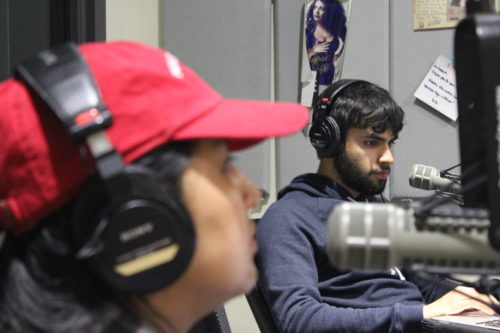
WMSC’s student staff participated in the discussion on New Jersey’s heroin crisis.
Photo credit: Jessica D’Onofrio
WMSC hosted its second public affairs community report on April 5, a program about drug addiction in northern New Jersey called “Hooked: The Heroin Crisis.”
Students at the station identified drug addiction as one of the biggest problems in New Jersey and decided to broadcast a conversation about the topic, with a focus on heroin, to help increase public awareness.
WMSC was able to sit down with a group of substance abuse professionals from the Central Jersey area, who came into the studio to talk about the issue during the show.
Thomas Franklin, a journalism professor at Montclair State who has reported on the heroin trade in Paterson, acted as host for the hour-long broadcast. Guests to the show included Paul Ressler of The Overdose Prevention Agency (TOPAC), Daniel Regan of CFC Loud N Clear Foundation 501 c3 and James P. Curtin of the rehab facility Daytop New Jersey, in addition to various WMSC representatives.
During the broadcast, Franklin reported that heroin deaths in New Jersey are three times the national average. He then invited Regan, a former addict, to explain his own ordeals with heroin.
Regan is a co-founder and substance abuse counselor in the Central Jersey area today. He was very cooperative during the show and didn’t display any emotional impact when he shared his personal history as a drug abuser and dealer, his life-threatening encounters with drug lords on the west coast and the trials and tribulations that he successfully overcame through his determination.
“My drug use started when I was 12 years old,” Regan said. “I quickly fell into the thought process that this lifestyle was cool, and it was a way out of the insecurities that I was dealing with.”
It wasn’t until Regan was older, though, that he moved from using to selling drugs, and his own personal drug use worsened.
“I was a dirt bike rider, and then I hurt my back. I was prescribed Oxycontin and Roxycontin for those injuries. It went from using a quarter of a pill to using fourteen pills a day,” Regan said. Due to his drug use, Regan flunked his classes at Fairleigh Dickinson University and shortly after started taking heroin, a cheaper drug than the prescription pills he was using.
Franklin answered a telephone call during the conversation, and Daniel’s mother, Lynn Regan, was on the line. She called the radio station so she could voice her thoughts and give feedback about her son’s substance abuse history during the conversation.
Lynn Regan is an executive director of CFC Loud N’ Clear. She answer several of Franklin’s questions, confirming that her son started using drugs early in his teenage years. She also talk about the subliminal cues she would come across when she would find things in Daniel’s pockets, but would not be able to interpret them accurately.
When asked what advice she would give to parents in similar situations, Lynn Regan said, “Don’t host parties. Don’t buy alcohol for your children.”
Franklin shared one of his encounters when he was reporting on the heroin crisis in Paterson with listeners.
“When I was doing my reporting, I met one heroin user that was using for 10 years. Describe for us, what the heroin pull is like, Daniel,” Franklin asked.
Daniel describes the physical impact that heroin had on him when he was using and the side effects of heroin: “You have the physical aspect of it, where you’re sick and uncomfortable every day.”
“The heroin user that I have met said it was like having a baby,” Franklin said.
Regan agreed with this analogy, saying, “[The drug is] all you think about.”
Ressler is the CEO and founder of the Overdose and Prevention Agency in Hamilton. He wasn’t hesitant in sharing his story of the loss of his son to drug abuse during the segment. Ressler compared his son’s life to that of Regan’s. He went into full detail about the manufacturers of Oxycontin and the careless prescribing of pain medication.
Ressler also discussed what inspired him to launch his company: the simple fact that people weren’t aware of the Overdose Prevention Act, legislation that encourages bystanders to intervene in acts of overdose, including, but not limited to, calling 911 and administering the overdose antidote Naloxone to those experiencing heroin overdoses. He went into full detail about the odds and ends of different political issues in the field of treatment and recovery.
Ressler emphasized that his son had a tremendous amount of support during his addiction. “My son had a chance to get help. He had every opportunity to get his life together. Doctors were blind to [the] ripple effect of prescription drugs,” he said.
He also feels that doctors weren’t aware of the impact that prescription medication was going to have on society.
Ressler also discussed the impact of gateway drugs and how they’re responsible for leading to the more serious chemical addictions. In addition, he made it clear to the rest of the experts that he was the one that initially pushed for the Overdose Protection Act in New Jersey.
Ressler’s mission is to reach out to inner city communities and create an awareness for people battling and suffering from heroin addiction. According to Ressler, the money that is being put into treatment facilities is not helping addicts’ problems. In addition, he feels that doctors should use extreme discretion when prescribing drugs and that the monitoring system for pain medication in the United States needs to be revamped.
Between the conversations among the guests, Franklin gave insightful feedback and statistical information on heroin abusers in the state of New Jersey. He directed interesting open-ended questions, one after another, to each of the professionals during the conversation. The professor talked about some of his experiences when he was reporting on heroin and reconfirmed some of the information that he extracted from his prior research.
In searching for a solution to heroin addiction, Curtain, who works at a drug rehabilitation facility, suggested the steps that need to be initiated in order to solve the massive problem.
”What our field has today that we didn’t have years ago is an abundance of research. To know that opium and heroin is an addiction of the brain, [and] prolonged use rewires the brain, which make it powerful [are new findings]. Daytop was founded in 1963 in New York City. Fifty years ago, they neglected drug addicts. Daytop New Jersey is serving over 600 people a year, in the high schools as well,” Curtain said. Curtain revealed that, over the years, more attention has been directed towards recovery programs and treatment facilities in the United States.
“The medical field has abandoned addicts. We operate a special education program,” said Curtain. “Our mission is to restore people and help them return to their community and be productive.”
The program was especially impactful to the student staff of WMSC, some of whom weren’t familiar with the severity of the heroin epidemic in this state until the show. Junior Programming Director Juan Contla said about the heroin problem in North Jersey, “I originally didn’t know that heroin was having a significant effect in the North Jersey community. I met people from South Jersey and they told me that it was big down there.”
The group of professionals offered their assistance in the communities and shared their individual contact information at the end of the segment.
Franklin finished the program with his input on the subject: “I think it’s very important topic. I also think that it is good to have a radio program that addresses this particular topic. I believe that information and education [are] key. This is a problem that exists in every town and in many homes in New Jersey.”



